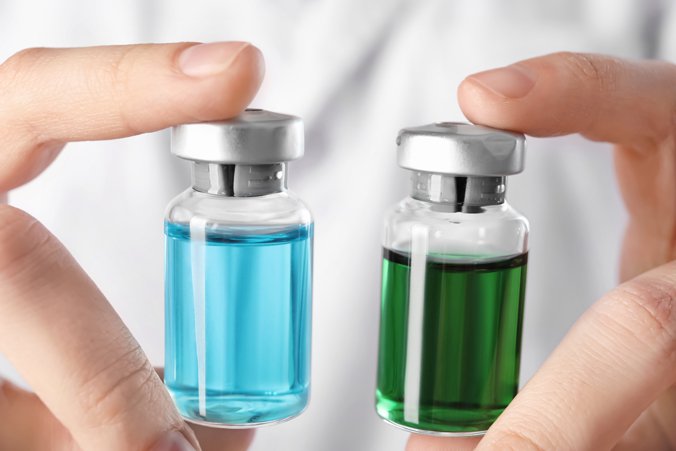Mease PJ, et al. Ann Rheum Dis. 2019;doi:10.1136/annrheumdis-2019-215386.
Ixekizumab is superior to adalimumab in simultaneously improving both joint and skin disease in patients with psoriatic arthritis who have had an inadequate response to conventional synthetic DMARDs, according to data published in the Annals of the Rheumatic Diseases.
“This is the first head-to-head study of two biologic agents in PsA,” Philip J. Mease, MD, of the Swedish Medical Center, in Seattle, told Healio Rheumatology. “Head-to-head studies allow us to truly compare two agents because the medications are studied in the same population cohort as opposed to indirect comparison studies in which data is obtained from separate trials and an indirect comparison is made.”
“In particular, the ixekizumab-adalimumab study allows us to compare two different mechanisms of action, IL-17 inhibition and TNF inhibition,” he added. “As more drugs and mechanisms are studied and approved for PsA, head-to-head trials will help clinicians and payors make decisions about medication choice when there are many drugs to choose from.”
To compare the efficacy and safety of ixekizumab (Taltz, Eli Lilly) to that of adalimumab (Humira, AbbVie) among patients with active PsA and skin disease, who have also demonstrated inadequate response to conventional synthetic DMARDs, Mease and colleagues conducted the SPIRIT-H2H trial. According to the researchers, SPIRIT-H2H is a 52-week, multicenter, open-label, parallel-group phase 3b/4 study that randomly assigned 566 patients, who had not previously received any biological DMARD, to receive either ixekizumab or adalimumab.
The primary objective was to analyze whether ixekizumab was superior to adalimumab at week 24 for both a 50% or greater improvement in ACR50 and a 100% improvement in the Psoriasis Area and Severity Index (PASI100). Secondary objectives included determining whether ixekizumab was noninferior to adalimumab for achieving ACR50, and whether it was superior for PASI100, at week 24. Mease and colleagues also analyzed PsA, skin and treat-to-target outcome measures during the study period.
Among the randomized participants, 269 in the adalimumab group and 262 who received ixekizumab completed the week-24 visit.
According to the researchers, ixekizumab met the primary objective, besting adalimumab in the composite ACR50 and PASI100 outcome — 36% for ixekizumab vs. 28% for adalimumab (P = .036). In addition, ixekizumab was noninferior for the ACR50 response — 51% compared with 47% among patients in the adalimumab group — and superior for the PASI100 — 60% compared with 47% among patients treated with adalimumab (P = .001).
“The psoriasis results could have been expected based on the known high effectiveness of IL-17 inhibition in achieving psoriasis responses,” Mease noted. “Although in separate trials of adalimumab and ixekizumab, one can see numerically similar ACR responses, to see comparable results in a direct head-to-head trial was confirmatory that ixekizumab worked as well as the TNF inhibitor in achieving arthritis response.”
The researchers also reported that ixekizumab demonstrated better responses, compared with adalimumab, in PsA, skin, nail, treat-to-target and quality-of-life outcomes. Serious adverse events occurred in 8.5% of patients in the adalimumab group and in 3.5% of those treated with ixekizumab.
“The results showed that these are two highly effective mechanisms of action for the various clinical domains of PsA, and gives us confidence that the ‘newer’ mechanism — more recently approved — IL-17 inhibition, is not only superior in the skin but holds its own against a TNF inhibitor in musculoskeletal domains,” Mease said. “Historically, I have heard some rheumatologists say that although the IL-17s are certainly excellent in the skin, they are not as effective in the musculoskeletal domains as the TNF inhibitors. The results of this trial help dispel that notion and instill confidence in this mechanism of action.” – by Jason Laday
Disclosure: Mease reports research grants and personal fees from AbbVie, Amgen, Bristol Myers Squibb, Celgene, Janssen and Lilly, as well as personal fees alone from Boehringer Ingelheim, Galapagos, Genentech and Gilead. Please see the study for all other authors’ relevant financial disclosures.
Original Source: https://www.healio.com/rheumatology/psoriatic-arthritis/news/online/%7B4c1d4bf8-ebfb-4622-913c-20b054dc5b19%7D/ixekizumab-superior-to-adalimumab-for-joint-skin-improvement-in-psa
